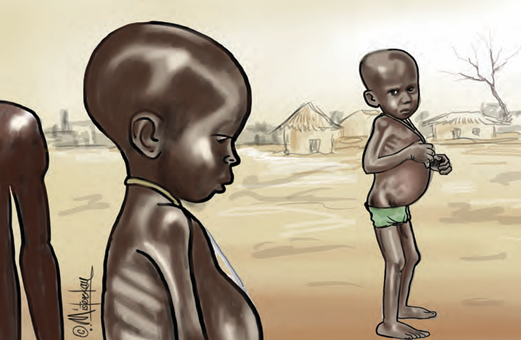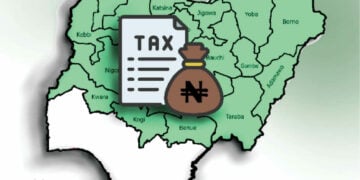As political season begins in Nigeria ahead of the 2027 elections, we are beginning to see another round of promises, slogans, and declarations of vision. Billboards will soon rise, rallies will be held, and political actors jostle for public attention. But beneath this loud, choreographed performance, a quieter tragedy unfolds in the country’s northern belt—children are wasting away, not in war, not in displacement, but in silence. The contrast is jarring while politicians vie for airtime, a grave, slow-motion emergency is eroding the potential of an entire generation. Across northeast and northwest geopolitical zones, severe acute malnutrition has reached levels comparable to what is often seen in war times. Yet no formal war is raging. Instead, an absence of attention, of priority, of leadership is doing the damage.
I first sensed the scale of that dissonance on a sweltering July afternoon in in my visit to one of the northern states. A nurse at a community health post held up a measuring tape— green for healthy, red for danger—around the twig thin arm of a three year old girl. The dial fell deep into crimson. “We see wartime numbers,” the nurse whispered, shaking her head, “but there is no war.” That single sentence captures the moral puzzle now facing Nigeria: How can such devastation grow in the relative calm of peacetime?
Counting The Unseen
In clinics scattered across the North, community health workers continue their daily rituals: measuring the circumference of toddlers’ arms, documenting weight loss, and trying, with limited resources, to stem a tide of hunger that has outpaced both state responses and national outrage. According to the International Committee of the Red Cross, over 3.7 million people are acutely food insecure in northern Nigeria. However, this figure, as dire as it is, likely underestimates the accurate scale of the crisis. Many remote villages receive no formal visits, no surveys, no clinical screenings—only the steady arrival of hunger and poverty. Factor them in, and the count edges toward five million. Even these aggregates blur the lived reality. In Zamfara’s dusty hamlets, entire households survive on a single meagre meal; in Yobe’s IDP camps, mothers dilute porridge to stretch one cup for three children.
The UN Office for the Coordination of Humanitarian Affairs (OCHA) had warned that in 2024 alone, more than 700,000 children in the region suffered from severe acute malnutrition (SAM), with over 100,000 of them at imminent risk of death without urgent medical intervention. The figures in 2025 will be even more staggering, given the recent evidence of malnutrition in the area. Médecins Sans Frontières (MSF), also known as Doctors Without Borders, has raised alarm over the growing number of malnourished children in Nigeria, revealing that it admits more than 400 cases daily in Kebbi State alone. Malnutrition is rarely dramatic—it arrives in shrunken bellies and dulled eyes, in children too tired to cry and mothers too weak to breastfeed. It creeps in through drought, displacement, conflict, food inflation, and broken systems. And because it does not explode, it often does not make headlines. Unlike terrorism or natural disasters, it is quiet. But it is just as deadly. Every single day in Nigeria, approximately 2,300 children under five die, and malnutrition is a contributing factor in nearly half of these deaths.
Crisis Of Neglect
The painful truth about this crisis is its preventability. Hunger in northern Nigeria is not a natural disaster, but a consequence of a system that values political optics over structural reform. During campaigns, politicians often launch food drives and cash transfers with great fanfare—short-term gestures that provide immediate relief and long-lasting headlines. However, these interventions are rarely part of a long-term strategy. They do not enhance food production, maternal health, access to clean water, or early detection systems. There are no incentives to invest in reforms that take years to show results. Why build resilience when elections are won by what people can see now?
The cost of ignoring malnutrition is profound and enduring. A stunted child is not just a personal tragedy but a national one. Nigeria has the second-highest burden of stunted children globally, with an estimated twelve million under the age of five affected by chronic undernutrition. Nearly one in three Nigerian children is stunted, which means their physical and mental growth is permanently impaired. These children will likely do worse in school, earn less over their lifetimes, and face greater risks of chronic illness. The World Bank estimates that malnutrition can reduce a country’s GDP by up to 11 per cent when you account for lower productivity, higher health costs, and lost potential.
Every untreated case of malnutrition is an invoice deferred to the future. Neuroscientists remind us that the first 1,000 days of life shape the brain’s wiring. A stunted child may never fully catch up cognitively, no matter the quality of later schooling. Economists convert those impairments into lost productivity, estimating that Nigeria could be forfeiting 2–3 per cent of its GDP annually. Public health accountants tally the hospital admissions for pneumonia and diarrhoeal disease that soar when immune systems are starved of zinc, iron, and vitamin A. Sociologists track the link between food scarcity and unrest, noting how hunger can erode social trust faster than any televised grievance. Put differently: malnutrition is not just a humanitarian concern—it is a stealth saboteur of national security, economic diversification, and educational reform. Ignore it, and every other development target becomes more complex and more expensive to hit.
Glimmers Of Hope
And yet, there are glimmers of what is possible when leadership is guided by vision and conscience. A state in the southeast has introduced a “one balanced diet a day” policy for all school-age children, recognising the devastating effects of hunger on education, health, and long-term human capital. This singular act, although modest in scale, presents a transparent and replicable model that other states should adopt urgently. It shifts nutrition from being an emergency response to a daily, institutionalised commitment, integrating school feeding with agricultural and health systems. Already, early evaluations show improved school attendance, weight gains in children, and even local economic stimulation through the sourcing of produce from nearby farms.
Federal Intervention And Hope Rising
Dr. Ali Pate, Nigeria’s Coordinating Minister of Health and Social Welfare, is leading a comprehensive national effort to combat malnutrition as a public health emergency. His multi-sectoral approach combines immediate treatment with long-term prevention strategies. Treatment centres equipped with locally produced, ready-to-use therapeutic foods (RUTF) have been established in the northeast and northwest, achieving recovery rates of up to 90%. Funding has significantly increased, with $11 billion allocated by the federal government and an additional $60 million from UNICEF to support healthcare infrastructure and nutrition programs.
If Nigeria’s political class decides that malnutrition is not a side issue but the central test of stewardship, the nascent election season for the 2027 elections could mark the start of a renaissance in child survival and, by extension, national renewal. The road is narrow, the window short. Yet history is replete with moments when political will, once awakened, turned statistics into stories of recovery. The children of northern Nigeria deserve that pivot—deserve to swap the colour red on a measuring tape for the bright green of health, growth, and possibility. If Nigeria’s political class truly wishes to build a country that works for all, it must start by ensuring no child falls through the cracks of neglect. Let the road to 2027 be paved not just with promises, but with full bellies, thriving children, and a generation finally given a fair start.





